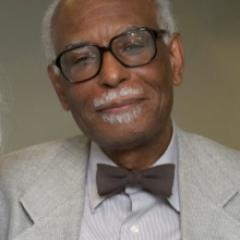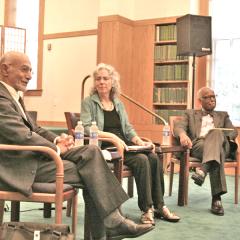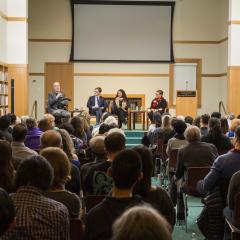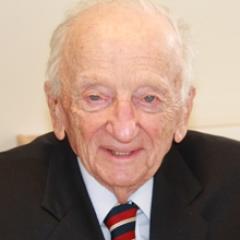Winston Langley on Inner Journeys and Global Transformations
Winston E. Langley is Emeritus Professor of Political Science & International Relations, and Senior Fellow at the McCormack Graduate School, University of Massachusetts Boston, where he served as Provost and Vice Chancellor for Academic Affairs from 2009 to 2017. Dr. Langley’s scholarly interests include human rights, alternative models of world order, religion, and politics. His publications include Kazi Nazrul Islam: The Voice of Poetry and the Struggle for Human Wholeness and the Encyclopedia of Human Rights Issues Since 1945. A longtime friend of and advisor to the Ikeda Center, Dr. Langley spoke with the Center’s Mitch Bogen in April 2019 to offer his thoughts on his vision for global peace and insights into Daisaku Ikeda’s efforts toward the same. Before the formal interview commenced, he expressed his admiration for Mr. Ikeda’s “unconstrained optimism,” which “flowers as you encounter him.”
During this interview we want to talk about Daisaku Ikeda’s most recent peace proposal, as well as about the peace proposals in general, but before that I thought we might get into the more philosophical aspects of Ikeda’s work, including Engaged Buddhism, which I know is something you have written on and care about. But first, is there a foundation or inspiration for yourself and your work that you would call spiritual, or perhaps ethical, or other formative influences?
There are several features to my own inspiration. But I think the grounding of my passion might be something we call fundamental fairness. That’s as a social matter. As for the matter of how we come to know things, as an epistemological matter, I admire President Ikeda, and Buddhism, because it requires an inner journey—and especially in an age in which everything is seemingly externalized, the consistent focus on the need for that inner journey is something that I admire.
I am guessing that your own inner journey is ongoing. Where are you at in that journey right now?
Well, I always think that these journeys are unpredictable in their flow times, and there are pauses, etc. I’m engaged in some reflective writing. I’m in an area that is also being explored by Dr. Ikeda, something called human security, arguing that it has very little to do with the state. That in fact its seat is with the human beings, and the state can never be secure without the security of human beings. And then, how do we get there?
A stunning part of Ikeda’s new peace proposal is something he quoted from Carl Friedrich von Weizsacker, which is the idea of “peacelessness” as a problem of the soul. We can do many things under the claim of being committed to peace, but unless we see this particular moral and spiritual problem I don’t think we will get far in that journey toward the end we are seeking, peace.
The focus on individuals simultaneously makes the challenge immense, since we are talking about all people, or at least a great number of people, undergoing an inner transformation toward peacefulness that can spread outward; but on the other hand it is hopeful because each individual can make a difference and there is nothing stopping them from the journey, for example, not even the state. Mr. Ikeda calls this human revolution. What does this concept mean to you?
Well, it means that to change anything fundamentally we must first begin with the principal agents of fundamental change, namely individuals, and to the extent to which we have individuals engaging in that change, in themselves, it’s likely that achieving many things becomes possible. First, is the empowerment of the individual who understands that the change that began with him or her later becomes a collective one. Second, there is likely to be a psychological understanding that future changes can be brought into being and that there is the possibility of continuing change, and that the power lies within oneself. Thirdly, changes are always disruptive, and sometimes they need certain refinements as they develop. Individuals have the capacity for that refinement, especially as they observe how changes affect people differently. The same authors of the change—and I assume we are moral beings, with moral concerns for others—have concerns for the uneven ways in which a change may have or have had impacts. Fourth, it also suggests an implicit acknowledgement that one’s role in change bears with it something of an equality of moral responsibilities that has some correspondence to what we call equality of rights, the former frequently left out of discussions. Finally, the human revolution also suggests that it represents an important answer to the idea of whether democracy is possible and the extent to which it is governable.
When I heard you say that these changes can be disruptive it made me realize that this is one reason I’ve gone into education, so that the disruptions caused by changes aren’t destructive. And I think this might relate to why Ikeda calls education the “culminating undertaking” of his life. Can you talk about how disruptive changes can be value creating as opposed to not?
We’re not omniscient in the sense that at any given time we have all the knowledge we need to reflect on the world and our behavior, individual and collective. As we become the agents of change, the change is not just external to us, there are reciprocating effects. As the environment in which we find ourselves and our relationship to it changes we gain knowledge, and that knowledge becomes part of the value-creating process. It opens up possibilities previously undreamt of.
Indeed, it was a very interesting difference between Daisaku Ikeda and Arnold Toynbee, if you follow their exchanges*, where you will find a certain pessimism in Mr. Toynbee about what is possible, but a different take from Mr. Ikeda about what was possible in the future. In his recent peace proposal, it was interesting that very early in it he spoke in terms of the developments which are not encouraging, and yet he found hope. For example, in young people or in the various, emerging grassroots movements. And then he moved into the areas in which this hope might be properly grounded for continuing change toward peace, human solidarity, etc., etc. So I think his position in education is correct, not only for individual enlightenment but for the collective sharing in the change, and the collective sharing in the knowledge that ensues therefrom.
There is the importance of this inner journey, but there is a relationship here between this inner journey and outer goings on.
Winston Langley
When you mentioned how changes are reciprocal within our environment, that sounded very much like Buddhism, that our environment is a reflection of our inner state, our actions, our choices, and so on. Can you talk a bit about what your understanding of Engaged Buddhism is?
My understanding is … I grew up with very early exposure to Buddhism, but it was a different version of Buddhism than the one we encounter in Mr. Ikeda. It was one that spoke to a tradition of the individual, yes, but in an ascetic way, and often as a single pursuit with little entangling with the surrounding social and political being, as it were. Engaged Buddhism reverses that, and says that, yes, there is the importance of this inner journey, but there is a relationship here between this inner journey and outer goings on. So there is a link and this link ought to be pursued not only in the abstract but toward certain desirable social ends.
One way to put it might be that in the older, traditional model, enlightenment is achieved by withdrawing and in Ikeda’s model, enlightenment can only be achieved in relationship with society.
Yes, and I share that view, broadly.
What are some of the other qualities President Ikeda exhibits in his peace proposals, but also, perhaps, in his role as a leader?
One important idea of his is that we ought to shift our approach to the most important problems affecting human beings away from what is often called the “high politics” vested in the Security Council of the UN. When that organ was created it was understood that that was where high politics would take place. The General Assembly and the other organs could deal with the other matters. But Ikeda said peace is too important a matter for this problem of the soul to be left to high politics. Indeed, that’s the reason we haven’t gotten very far, or as far as we had hoped. His belief is that this ought to be part of a more popular effort in which the world at large is engaged. And he goes on to identify some of the developments from below that can have a long-term impact on the question of whether we can remove this illness of the soul.
Now that is a broad statement, but to consider a particular instance, one of his areas of focus over the years has been on women. And in 2014, I think, the UN Resolution 1325 made issues affecting women and children—especially during times of international conflicts—part of “high politics,” to be addressed by the Security Council; those issues had, until 2014, been left to “low politics.” Dr. Ikeda had been saying, for years, that even this change, on the part of the Security Council is not enough; we need to ground efforts to protect women and children, during times of conflict, in more popular understandings, commitments, and actions.
I thought that the part of the proposal that contains within it the most profound promise for change and for popular engagement is the focus on youth, mainstreaming youth movements. I think if that were understood well, and its promise, then one could afford quite a bit of hope for what the future holds. I think that part of the proposal was laden with promise and insight.
He’s been so clear and consistent with this focus on youth. He’s challenging the notion that young people should be quiet while their wiser and more experienced elders steer the ship. We can see where that’s gotten us. And, as you noted, he’s been very consistent in the proposals that there has to be a grassroots element to peacebuilding. I think he identifies this component, for example, as a big part of the successes we’ve seen recently in relation to nuclear weapons.
Yes. He goes into a series of initiatives that have made a difference. For example, he points to how we deal with the land mining during warfare that later has all sorts of destructive impacts in society and how we came to wrestle with this, not through the efforts of those who control high politics but through popular outrage, popular concern, popular focus. I think he saw that largely also in respect of efforts to ban nuclear weapons entirely, that there is a larger push. And indeed, the nuclear weapons powers are not particularly appreciative of this effort at all. And our own US is very much against it. Britain is against it. But he is pushing; and I hadn’t known this before I read this proposal, that he has it as a central part of SGI’s program for the work of youth, so it’s all tied together here. He’s being an example to the world in this sense.
There was one aspect of the new proposal in particular I wanted to ask you about, which I believe relates to your work in international relations. This has to do with what he calls the “castle walls” approach to national security, which presents a “false choice” between nationalism and globalism, and which in his view will indeed exacerbate our problems by leaving globalism to forces that “prey upon the weak,” ironically encouraging people to further entrench. How do you see us best dealing with the nationalism versus globalism issue?
Well, in 1787, in this country, there was a recognition that a number of things were failing. The confederal government could not get enough money for its budget. Connecticut and Pennsylvania were at war. New Jersey and New York were always threatening one. There could be no control of commerce and various ports. They decided that there may be a way in which the sovereign subdivisions of equal states (New York, Massachusetts, etc., etc.) and the central government might work better together. They formed a federation without in any way limiting the chances for the local entities to find their way in the world. I think we could do that. I think that’s what he is getting at. There is a way of preserving the nation states, with all of their cultural identities, proclivities, etc., and still have a central authority globally that could deal with matters that are best dealt with at that level, namely, security, environmental issues, commerce broadly understood, not unlike “Congress shall have the authority to regulate interstate commerce.” I agree with him! If we say that globalism and the idea of the nation cannot coexist, I think we are in for troubles undreamt of.
So, there has to be a way in which these can be reconciled, and in my mind, since 1945 we have been going at it at the level of human rights, for example, the Universal Declaration of Human Rights along with the two international covenants which, together, make up the International Bill of Rights. They, together or separately, have laid the foundation for regional instruments such as the African, European, and Latin American instruments on human rights. Europe has been most advanced in this. It has its own regional court, which has been quite effective. It deals in matters pertaining to human rights issues in Europe, all consistent with the broader global, legal, and moral umbrella under which it operates.
In one of your articles you contrasted the human rights regime with what is called the relative deprivation model** of international relations. And you feel the human rights approach is wiser and more promising. Why do you argue this?
Because I think the human rights regime captures a broader sense of what it means to be human. The relative deprivation model thinks primarily in terms of the old view of human beings as economic animals. And the presence of the spiritual or the social, etc., is almost missing. So I think the human rights model has a better hold on what it is to be human. To be identified as human assumes an inalienable dignity for all, regardless of other identities—national, religious, linguistic, ethnic, gender, social condition, among others.
And, especially, if one thinks in terms of fourth generation human rights, where certain collective efforts are focused on—the right to peace, the right to an environment that is nurturing of life and sustaining of the earth, and other like rights—this to me captures the sense that in the world at large in which we live there are many agents, and what one may call co-presences. So we should not assume that domestic pets, for example, or those that are not domesticated, do not have their own system of sharing communication with us and with others, and that part of whatever unique role we play might not include them. Indeed the idea that we are part and parcel of nature is a far better way of understanding ourselves and others and the environment outside of us, and relative deprivation doesn’t capture all of that.
In your piece I think you suggested that relative deprivation, which I believe is the model where, in essence, states might look around and say that one state has too much of this and another has too little of this. You say that this does two problematic things that the human rights orientation does not: it encourages zero-sum thinking and also encourages what you call “othering.” Can you say more on this?
Yes. If when I look around in the world and see that others have and I do not, and I can be satisfied only by having what they have, it begins with something that is not a proper moral base for change. Covetousness: I covet what somebody else has, as it were. And what kind of moral system can we develop and shape in which covetousness is its central operating mechanism? How do we deal with the issue of the collective enterprise? Where is that speaking to human spirituality and wholeness? I don’t find it at all.
Value creation is the central idea of the Soka movement. In your view, what would be some of the components of what we might call a value-creating approach to creating a more just world of widespread individual, social, and environmental well being?
I understand this to mean that each person can, through her or his effort, improve her or his experiences in life and the experiences of others, including society at large, and that the apparently most forbiddingly negative circumstances hold opportunities for change and transformation. In September 2015, for example, the world decided to put sustainable development at the center of international economic cooperation, as part of the effort to deal with climate change. This is part of the Paris Agreement of that date, in the midst of gathering despair about the international political will to deal with climate change. So, elimination of poverty, providing education for all, ensuring proper land use, decent jobs, and adequate health care are part of a new international commitment to environmental issues.
Let’s transition to matters of poetry and art. I understand you share Mr. Ikeda’s love of poetry, and I think we could agree that poetry and the arts constitute a unique form of value creation with unique benefits. Can you talk about what poetry means to you, and perhaps what you perceive in Daisaku Ikeda’s poetry?
I see poetry as a major revelatory instrument in human life, that its principle is to point out relationships, and certain commonalities in those relationships, and in doing so it also identifies some contrasts. And it also is a pointer to human creativity and that that creativity has its seat in the interaction between the inner being, again, and the environment in which one finds oneself. Indeed, one may say it’s part of value creation. One may say it’s part of a dialogue between the self, within the self, since there is the private, individual self, there is the social self, and the national self, etc.; and then Buddhism speaks of this fundamental Greater Self. So you have these dialogues taking place among and within different selves. It’s the revelations from these relationships, and the possibilities we spoke of earlier, that poetry is capable of opening us to.
The color of a flower is not simply an expression of a chemical combination, as it were. It may be, in poetry, a call from a flower. Maybe a “Good morning to you!” Well, that says something about the possibilities of our nature’s speech to us. And all art sends us back to the self, to reflect on the multiple signals, the multiple messages, that we may in fact receive to help us understand ourselves and to help us understand our fellow human beings, and to understand the society we would like to have.
I think that Ikeda’s poetry is very consistent with his outlook on life and our systems. It offers that focus on the relationships that exist that are not always immediately obvious but are revealed in poetry. This allows us to understand better the links between us and what we may think of as the other and also that that other in fact might very well be here, and might be part of me and I a part of the other. I could not enjoy the sweetness of the fruit had it not found a complement in my own being, or the dance of a flower if it had not been part of me also. That’s part of what poetry does.
Ultimately we find that the most enduring features of human history are the spiritual expressions that come through the arts. And we tend to use them as a measure of achievement, not so much the power one may have had, or the power one may have wielded.
In Buddhism there is the notion of skillful means. It could be that poetry is the most skillful of means because it enables the other to awaken, but to awaken in their own way, and in their own time. Does this make sense?
It makes sense, yes, it makes sense. To me that is part of its revelatory power, and it will occur sometimes when one least expects it.
Is there any idea that has occurred to you during this talk that you would like to add before we close?
While on a recent trip to Dhaka, Bangladesh, I was reading a book on moral courage, some of the research on which took place in Bangladesh. One of the themes in the book is compassion and how this concept, encompassing love, cuts across culture. In coming to know Dr. Ikeda’s work, I got a better sense of compassion. In his view, I think, compassion is not pity, as is commonly supposed, but a kind of co-passion, fellow feeling, potential for care and concern, for the suffering of others which resides in each of us. I think in our search for human solidarity, this value will become more and more important.
Notes
* See Arnold Toynbee and Daisaku Ikeda, Choose Life: A Dialogue (London: I.B. Tauris & Co., 2013). First published by Oxford University Press, 1976.
** “Relative deprivation is the lack of resources to sustain the diet, lifestyle, activities and amenities that an individual or group are accustomed to or that are widely encouraged or approved in the society to which they belong.Measuring relative deprivation allows an objective comparison between the situation of the individual or group compared to the rest of society. Relative deprivation may also emphasise the individual experience of discontent when being deprived of something to which one believes oneself to be entitled, however emphasizing the perspective of the individual makes objective measurement problematic.” (https://en.wikipedia.org/wiki/Relative_deprivation)



